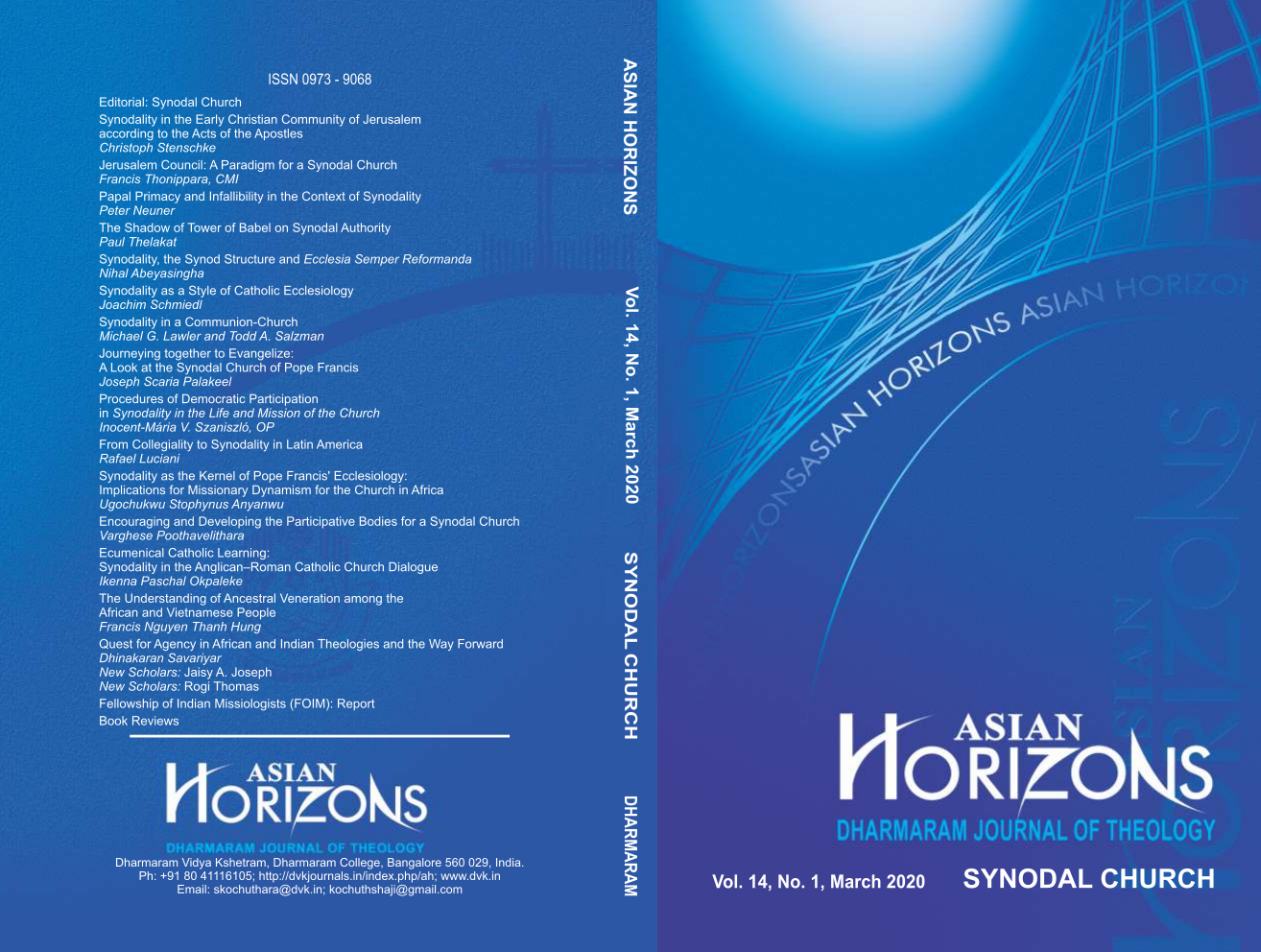The Shadow of Tower of Babel on Synodal Authority
Keywords:
Communion, Dialogue, Monologism, Heteroglossia, Synodality, TrinityAbstract
Synodality is a mode of being the church, interpreted in eight hermeneutical circles. The authority could be compared to writing a novel from dialogic orientation of a word among other words creating new and significant artistic potential in discourse. Every concrete utterance of a speaking subject is, accordingly, the locus in which centrifugal as well as centripetal forces confront each other. The processes of centralisation and decentralisation, of unification and disunification, intersect in the utterance. Every utterance is an active participant in such speech diversity. The freedom of people of God involve “much debate” but also much attention, which is prayer. The leader has to become an exiled author with the power of persuasion in the mystical body becoming a confessing church with the word of God becoming event of communion. The power of a Synod is the power of the holy language, which is dialogue.
References
Francis, Pope, Evangelii Gaudium
Francis, Pope Apostolic Constitution Episcopalis Communio, September 2018.
Henri De Lubac, The Church: Paradox and Mystery, translated by James R. Dunne. Staten Island, NY: Alba House, 1969, 25.
Samuel Gregg, “Pope Francis, Henri de Lubac, and the Decentralizing of Church Authority,” The Catholic World Report, September 6, 2016.
Hans Urs von Balthasar, Theo-Drama: Theological Dramatic Theory. Volume I: Prolegomena, trans. Graham Harrison, San Francisco: Ignatius Press, 1988, 320.
L. Wittgenstein, Tractatus logico-philosophicus, transl. by David F. Pears and Brian McGuinness, Introduction by Bertrand Russell, London: Routledge & Kegan Paul, 1961, rev. ed. 1963, 6.522.
Mikhail Bakhtin, The Dialogue Imagination, trans. Caryl Emerson and Michael Holquist, ed. Michael Holquist, Austin: University of Texas, 1981, 262.
Michael Holquist, Dialogism: Bakhtin and his World, London: Routledge, 1990.
M. Bajtin, Yo también soy, Fragmentos sobre el otro, Méjico: Taurus, 2000, 156.
R. Barthes, “The Death of the Author,” in R. Barthes, Image, Music, Text, edited and translated by Stephen Heath, New York: Hill and Wang, 1977, 143.
M. Bakhtin, Speech Genres & Other Late Essays (13. ed.), ed. Caryl Emerson and Michael Holquist, translated by Vern W. McGee, Austin: University of Texas Press, 2013, 110.
W.D. Ross, Aristotle: A Complete Exposition of His Works and Thought, New York: Meridian Books, Inc., 1959, 175.
E. Husserl, Cartesian Meditations, The Hague: Martinus Nijhoff Publishers, I960, 157.
L. Wittgenstein, Philosophical Investigations, Oxford: Basil Blackwell, 1972, Sec. 123.
Richard Kearney, The God who may be: A Hermeneutics of Religion, Indiana Series in the Philosophy of Religion, Bloomington & Indianapolis: Indiana University Press, 2001, 108.
R. Kearney. “Re-imagining God,” in Transcendence and beyond: A Postmodern Inquiry, ed. John D. Caputo & Michael J. Scanlon, Bloomington: Indiana University Press, 2007, 62.
Ernst H. Kantorowicz, The King’s Two Bodies: The Mediaeval Political Theology Tells of the Two Bodies of the King, Princeton, New Jersey, 1957.
K. Rahner, The Trinity, New York: Herder and Herder, 1970, 10-11.
J. Moltmann, The Trinity and the Kingdom, London: SCM, 1981, 197.
M. Bakhtin, “From Notes Made in 1970–71,” Speech Genres and Other Late Essays, ed. Caryl Emerson and Michael Holquist, Trans. Vern W. McGee, Austin: University of Texas, 1986, 147.
M. Bakhtin, Rabelais and His World, Bloomington: Indiana University Press, 1984, 197-198.
M. Bakhtin, The Dialogical Imagination, ed. M. Holquist. Austin: University of Texas Press, 2006, 26.
Mikhail Bakhtin, Problems of Dostoevsky’s Poetics, ed. Caryl Emerson, Introduction by Wayne C. Booth, Theory and History of Literature, Vol. 8, Minneapolis: University of Minnesota Press, 1984, 110.
Bakhtin, Problems of Dostoevsky’s Poetics, 252.
Simone Weil, An Anthology, London: Penguin Books 2005, 231-232.
Augustine, Confessiones, X, 6(8) and 33(50).
Jacques Derrida/John Caputo, Deconstruction in a Nutshell, New York: Fordham, 1997, 166.
Peter Brown, Introduction to an English translation of the Confessions, trans. F.J. Sheed, Indianapolis: Hackett, 1970, xiii.
John Caputo, The Prayers and Tears of Jacques Derrida, Bloomington: Indiana University Press, 1997, 295.
Henri de Lubac, “Disappearance of the Sense of the Sacred,” in Theology in History, San Francisco, CA: Ignatius Press, 1996, 231.
Michel de Certeau, The Practice of Everyday Life, Berkeley: University of California Press, 1988, 29–36.
Balthasar, quoted in Peter Henrici, “Hans Urs von Balthasar: A Sketch of His Life,” in Hans Urs von Balthasar: His Life and Work, ed. D.L. Schindler, San Francisco: Ignatius Press, 1991, 11.
Hans Urs von Balthasar, Our Task: a Report and a Plan, San Francisco: Ignatius Press, 1994, 132, 150-156.
A Derrida Reader: Between the Blinds, ed. Peggy Kamuf, Hemel Hempstead: Harvester Wheatsheaf, 1991, 244.
Jean-Luc Marion, God Without Being, Chicago and London: The University of Chicago Press, 1991, 70.
Bakhtin, Problems of Dostoevsky’s Poetics, 110.
George Orwell, Nineteen Eighty-Four, The Annotated Edition, London. Penguin Books, 2013, 285.
M. Bakhtin, Rabelais and His World, trans. Helene Iswolsky, Bloomington, IN: Indiana University Press, 1984, 90-1.
F. Dostoevsky, The Brothers Karamazov, translated from the Russian by Constance Garnett, New York: The Lowell Press, 1912, 259-291.
“Our Own Memory: A Q&A with Svetlana Alexievich,” Sampsonia Way Magazine, March 13, 2017.
Toni Morrison, “No Place for Self-Pity, No Room for Fear,” The Nation, 2015, 7.

